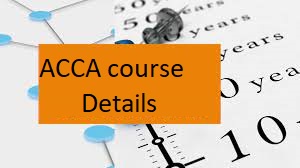In the realm of finance and accounting, ACCA is a well-known acronym that opens doors to numerous career opportunities. However, for those new to the field or considering an ACCA pursuit, understanding the full form of ACCA and the intricacies of the course is essential. In this comprehensive guide, we will not only reveal the ACCA full form but also provide an in-depth overview of ACCA course details.
Unveiling ACCA: ACCA Full Form
Let's begin by unveiling the mystery behind ACCA full form. ACCA stands for the Association of Chartered Certified Accountants. This prestigious organization is globally recognized for its role in helping individuals become Chartered Certified Accountants, a distinguished and respected title in the world of finance and accounting.
Navigating ACCA Course Details
To embark on the path of becoming a Chartered Certified Accountant, it is vital to understand the key details of the ACCA course. Here's a comprehensive overview:
Eligibility Criteria
Before you can embark on the ACCA journey, you must meet specific eligibility criteria. Generally, candidates need a minimum of three GCSEs (or their equivalents) and two A-levels (or their equivalents) in five separate subjects, including English and mathematics. However, it's important to note that entry requirements may vary based on the country and educational institution.
Structure of the ACCA Qualification
The ACCA qualification comprises three distinct levels, each designed to build expertise in different areas:
-
Applied Knowledge: This is the foundational level, consisting of three papers. It provides a solid grounding in fundamental accounting and finance concepts.
-
Applied Skills: Progressing to the second level, you'll encounter six papers that delve deeper into advanced topics such as taxation, financial management, and audit and assurance.
-
Strategic Professional: The pinnacle of the ACCA journey consists of two modules: Essentials and Options. The Essentials module includes papers on Governance, Risk Management, Ethics, and Professional Skills. The Options module offers specialization in areas like Advanced Taxation, Advanced Audit and Assurance, and more.
Exam Structure
Earning ACCA accreditation requires successfully passing 13 exams in total. These exams are held bi-annually, typically in June and December, and include both computer-based and written assessments. Candidates must aim for a pass mark of at least 50% in each exam to progress.
Practical Experience
In addition to excelling in the exams, ACCA candidates must accumulate a minimum of three years of practical experience in a relevant role. This practical experience ensures that you possess not only theoretical knowledge but also the practical skills needed to excel in the finance and accounting field. Importantly, this experience can be gained before, during, or after you complete the exams.
Ethics and Professional Skills Module
ACCA places significant emphasis on ethical behavior and professionalism within the accounting profession. As part of the qualification, candidates must complete the Ethics and Professional Skills module. This module equips you with the necessary skills to navigate complex ethical dilemmas commonly encountered in the finance industry.
Duration
The duration of your ACCA journey can vary depending on factors such as your prior education, study pace, and exam performance. On average, it takes approximately 2-3 years to complete all the exams and gain the required practical experience.
The Advantages of Pursuing ACCA
Now that we've explored the ACCA course details, let's delve into the compelling reasons why pursuing ACCA can be a prudent career move:
Global Recognition
ACCA is a globally recognized qualification. Holding ACCA accreditation opens doors to international career opportunities, as it is highly regarded by employers across diverse industries and geographic locations.
Versatility
The ACCA qualification is not confined to a specific sector or industry. Chartered Certified Accountants are in demand in finance, audit, taxation, consultancy, and even leadership positions across various organizations.
Earning Potential
ACCA professionals often enjoy competitive salaries and benefits. As you gain experience and advance in your career, your earning potential can increase significantly.
Continuous Learning
The finance and accounting landscape is dynamic and constantly evolving. ACCA's commitment to ongoing professional development ensures that its members remain well-informed about the latest industry trends and regulations.
Ethical Foundation
ACCA's strong emphasis on ethics and professionalism ensures that its members not only possess financial expertise but also uphold high ethical standards, enhancing the integrity of the profession.
Conclusion
In conclusion, ACCA, which stands for the Association of Chartered Certified Accountants, is a prestigious and globally recognized qualification in the field of finance and accounting. The course details encompass eligibility criteria, a structured curriculum, rigorous exams, practical work experience, and a strong focus on ethics and professionalism. Pursuing ACCA can lead to a fulfilling and rewarding career with global opportunities, competitive compensation, and the confidence of knowing you are part of a profession that places ethics at its core. If you aspire to become a Chartered Certified Accountant and unlock a world of financial possibilities, ACCA is an excellent path to consider. So, take that first step toward your ACCA journey, and embark on a promising career in finance and accounting.


No comments yet